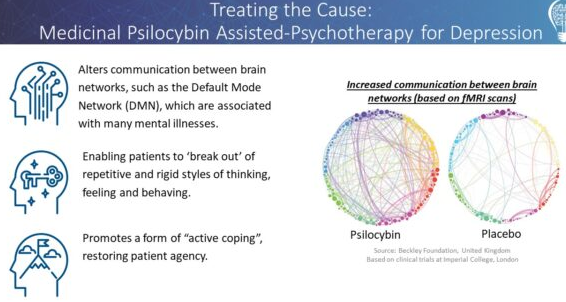BOURSESSENEGAL – Psychedelic therapy is emerging as a groundbreaking approach in mental health treatment. With increasing interest from both the scientific community and the public, it offers new hope for those struggling with mental health issues. This blog will explore the various aspects of psychedelic , its benefits, potential risks, and the latest research surrounding it. By the end, you’ll understand how this innovative treatment could change lives.
What is Psychedelic Therapy?
Psychedelic therapy combines the use of psychedelic substances, like psilocybin or MDMA, with therapeutic practices. This approach aims to facilitate profound emotional and psychological breakthroughs. By altering consciousness, psychedelics can help individuals access repressed memories, confront difficult emotions, and foster a greater sense of connection with themselves and others.
Historical Context
Psychedelics have a long history, dating back thousands of years. Indigenous cultures used these substances for spiritual and healing purposes. However, the rise of modern psychology in the mid-20th century led to significant research into their therapeutic potential. Unfortunately, political and social factors halted this progress in the 1970s. Thankfully, recent years have witnessed a resurgence in interest, leading to a renaissance of psychedelic research.
The Science Behind Psychedelic Therapy
Research into psychedelic therapy shows promising results. Studies indicate that psychedelics can lead to lasting changes in mood and behavior. For example, clinical trials have demonstrated that psilocybin can significantly reduce symptoms of depression and anxiety in patients with terminal illness.
Mechanisms of Action
Psychedelics influence serotonin receptors in the brain, particularly the 5-HT2A receptor. This interaction alters perception and mood, often resulting in enhanced emotional insights. Furthermore, these substances promote neuroplasticity, which is the brain’s ability to reorganize itself by forming new connections. This flexibility can be crucial for individuals seeking to overcome mental health challenges.
Benefits of Psychedelic Therapy
Psychedelic therapy offers numerous benefits. Let’s explore some of the most significant ones.
1. Treatment-Resistant Conditions
For many individuals, conventional treatments for depression and anxiety do not work. Psychedelic therapy can provide an alternative, offering hope to those who feel stuck. Research has shown that psychedelics can lead to substantial reductions in symptoms, even in treatment-resistant patients.
2. Enhanced Emotional Processing
Many people struggle to confront difficult emotions. Psychedelics can create a safe space for individuals to explore their feelings. By fostering a sense of openness and vulnerability, these therapies encourage deeper emotional work.
3. Increased Connectedness
Psychedelics often promote feelings of unity and connection. Many users report a sense of belonging and understanding during sessions. This interconnectedness can strengthen relationships and foster community bonds.
4. Spiritual Insights
For some, psychedelic therapy offers profound spiritual experiences. These moments can lead to lasting changes in perspective, promoting feelings of peace, purpose, and fulfillment. People often describe these experiences as life-changing.
Risks and Considerations
While the potential benefits of psychedelic therapy are compelling, it’s crucial to acknowledge the risks involved. Not everyone may respond positively to these substances. Some individuals may experience anxiety or distress during their sessions.
Psychological Risks
For individuals with a history of psychosis or severe mental health conditions, psychedelics can trigger adverse reactions. This possibility underscores the importance of thorough screening before embarking on a psychedelic journey.
Set and Setting
The environment in which the therapy takes place plays a vital role in the experience. A safe, supportive setting can enhance the therapeutic effects, while an unsettling environment may lead to negative outcomes. Therefore, it’s essential to approach psychedelic therapy with care.
How to Prepare for Psychedelic Therapy
Preparation is key to maximizing the benefits of psychedelic therapy. Here are some steps to consider:
1. Find a Qualified Practitioner
Look for a therapist experienced in psychedelic-assisted therapy. They should be trained to guide you through the process and help you integrate your experiences afterward.
2. Set Clear Intentions
Before your session, take time to reflect on your goals. What do you hope to achieve? Setting intentions can focus your experience and provide direction during the journey.
3. Create a Comfortable Environment
Ensure that your setting feels safe and comfortable. Surround yourself with supportive individuals who understand the process. This environment will help you relax and open up during the session.
The Future of Psychedelic Therapy
As research continues to unfold, the future of psychedelic therapy looks bright. More institutions are conducting clinical trials, and the results thus far are encouraging. Many experts believe that psychedelics could become a mainstream treatment option in the coming years.
Legislative Changes
Several regions are already exploring the decriminalization and regulation of psychedelics. As society becomes more aware of the benefits, we may see significant shifts in policy. These changes could facilitate broader access to psychedelic therapy for those in need.
Conclusion: A New Frontier in Mental Health
Psychedelic therapy represents an exciting frontier in mental health treatment. By harnessing the power of psychedelics, individuals can access profound insights, foster healing, and cultivate a deeper understanding of themselves. As research advances and public awareness grows, this innovative approach may transform the way we approach mental health care.
In conclusion, while the journey into psychedelic therapy requires careful consideration and preparation, the potential rewards are immense. With ongoing research and growing acceptance, we stand on the brink of a new era in mental health treatment, offering hope to countless individuals seeking relief from their struggles. If you’re curious about this transformative therapy, consider exploring further, and you might just discover a path to healing that resonates with you.
REFERENCE : https://www.health.com/



